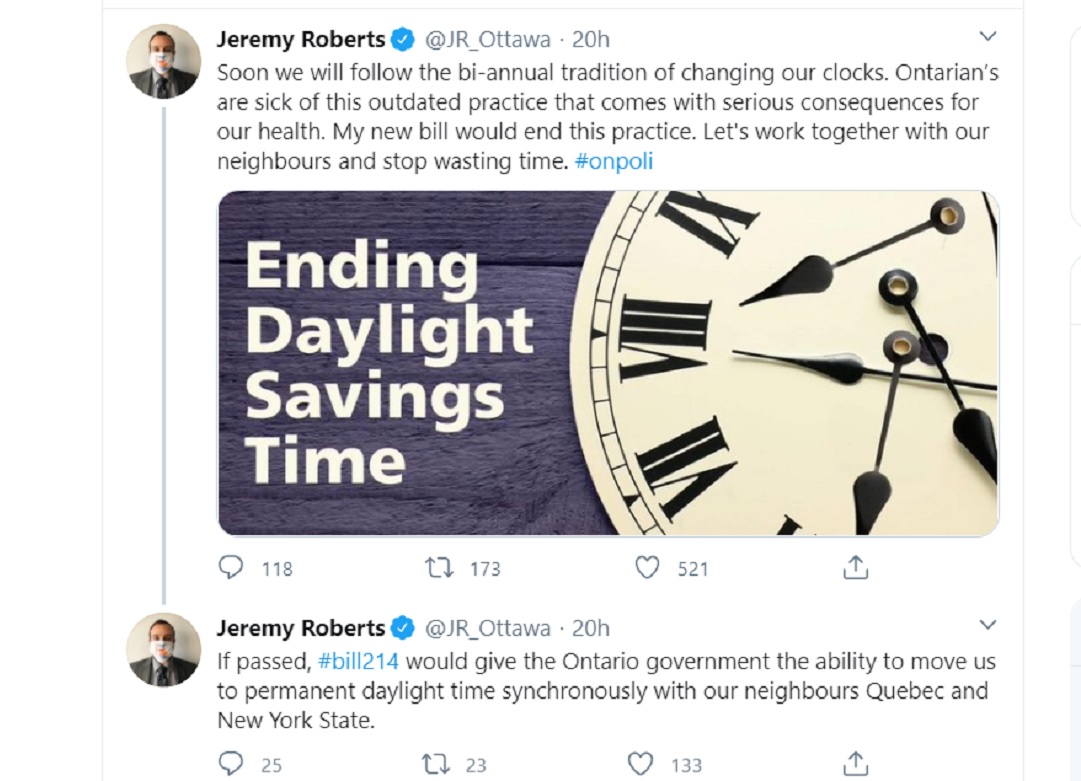Every spring most provinces across Canada move the clocks forward one hour (March), and every fall (November) the clocks are moved back one hour (Daylight Saving Time-DST).
The common saying for people to remember is “spring forward, fall back”. But most people don’t really like the practice, and studies have shown that there is evidence of increased traffic accidents immediately and for the first few days following these time changes. There is also a statistical increase in health problems like heart attacks in the few days following the time changes. As it also results in darkness in the late stages of the winter afternoons in Canada, say roughly around 4;30 p.m. (16;30), other evidence shows increased levels of depression in the winter.
So why do it?
It was actually begun in Germany during the First World War as a way to have a bit more daylight during working hours so as to conserve energy (coal), and was then quickly adopted by England and soon after other countries like Canada also as an energy conservation effort.
However it should be noted that although proposed prior to that elsewhere, a couple of cities in Canada were actually the first in the world to adopt the practice long before WW-I.
Now however, with the general dislike of the practice, Canada’s most populous province, Ontario, is proposing to stay on DST permanently. The proposal by an Ottawa area member of the provincial parliament (MPP) Jeremy Roberts,is known as Bill-214-An Act to Amend the Time Act and various other Acts. The bill has already passed second reading, a date for third reading has not been set
Ironically perhaps it was a northern Ontario city that was the first in the world to adopt seasonal time changes. That was Port Arthur (now Thunder Bay) back in 1908.

Maybe not soon though
In proposing the bill, backbench Progressive Conservative MPP Jeremy Roberts said in a media release, “I see this as an important first step towards fulfilling the public’s overwhelming desire to end this out-of-date practice”.
Indeed, while the idea has the support of his party, the change is only a ‘first step’. The proposal to make the change hinges on neighbouring Quebec doing the same, and to the south, the neighbouring state of New York, both of which are important trade routes and partners, and a coordinated time would be extremely important.
“I believe that by showing leadership in taking this step, Ontario can encourage our counterparts in Quebec and New York State to take similar action so that, together, we can put this issue to bed, and all be better rested for it,” Roberts added.
Right now only Yukon Territory (starting this year), most of Saskatchewan and a few towns in British Columbia have a permanent time.
British Columbia passed legislation for the entire province to do so last year but that won’t happen until neighbouring states to the south in the U.S. (Washington, Oregon, California) do so as well. While those states have voted to remain on Pacific Time, it requires approval of Congress, and right now, that’s not a priority.
Perhaps however, with the mass of Ontario’s business and population wanting to end the practice, it might push Quebec towards doing such a move and if so the combined economic weight of the two most populous provinces might just result in a push nationwide to adopt a standard time. As the world is involved in far greater priorities right now however, it doesn’t seem likely in the near future.
additional information – sources
- 680 News: L.Casaletto: Oct /20: Ontario could move permanently to Daylight Time
- BlogTO: L.O’Neil Oct 7/20: Ontario government tables bill to make Daylight Saving time permanent
- CP24: K.Wilson: Oct 7/20: Ontario government supports bill to make daylight time permanent
- CTV: Pringle/Vardon: Oct 7/20: Should Ontario move to daylight time permanently? An Ottawa MPP thinks so
- Canadian Press (PostMedia): Mar 5/20: Yukon adopts permanent daylight time as consultation wins overwhelming support
- Daylight Saving Time(website)







For reasons beyond our control, and for an undetermined period of time, our comment section is now closed. However, our social networks remain open to your contributions.